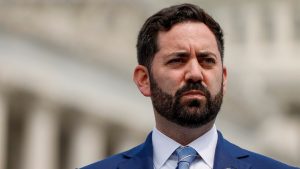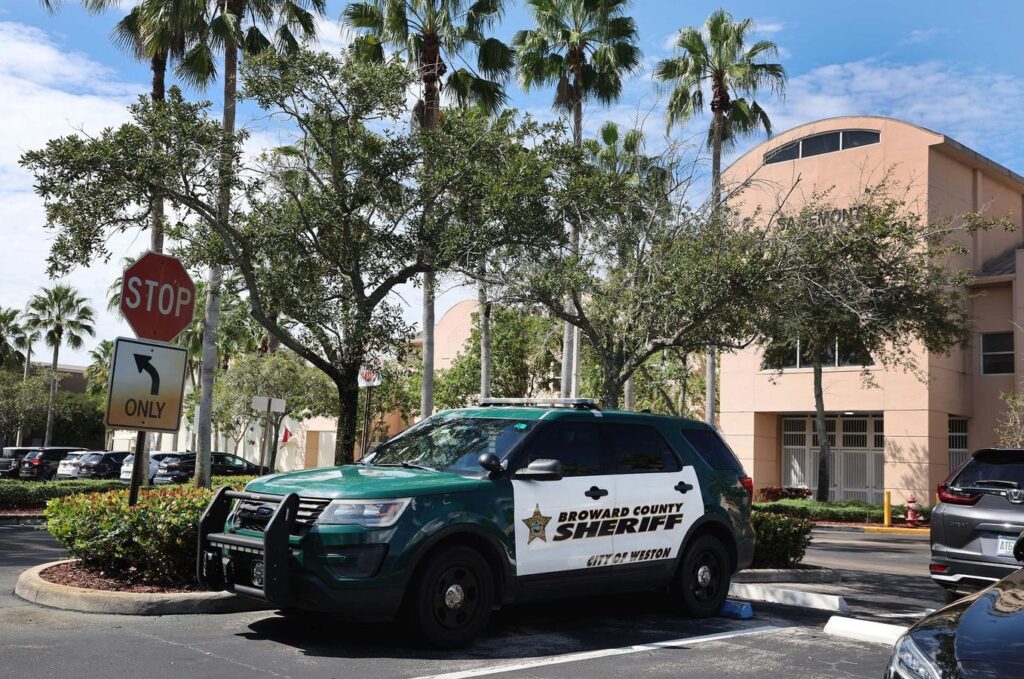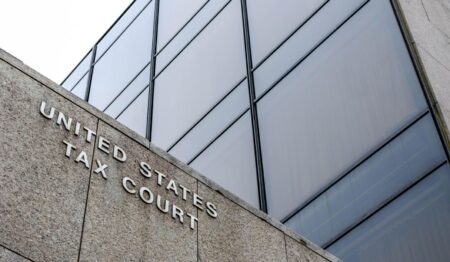We tend to think that police officers are busily enforcing our laws, but prosecutors in the Southern District of Florida allege that more than a dozen officers did just the opposite. Seventeen deputies in the Broward County Sheriff’s Office are accused of Covid-19 fraud-related charges totaling nearly half a million dollars.
According to Broward County Sheriff Gregory Tony, the investigation began in November 2021, after the office’s Inspector General “became aware of Paycheck Protection Program (PPP) fraud as an emerging trend within public service agencies.”
Shortly after, the Sheriff ordered “an agency-wide investigation of all 5,600 employees – from top to bottom.” Initially, detectives in the Public Corruption Unit determined that more than 100 employees had submitted applications for the PPP loans. However, according to the Sheriff, only the employees who did not obtain the loans legally were subject to criminal investigation.
Ultimately, 15 employees were arrested on federal charges. One current employee and one former employee self-surrendered at the federal courthouse in Fort Lauderdale. All are facing federal fraud charges related to the federal PPP and EIDL loan programs. Charges were filed in the United States District Court for the Southern District of Florida.
The Sheriff’s Office partnered with the U.S. Attorney’s Office, the Federal Reserve Board Office of Inspector General, and the Federal Bureau of Investigation as part of the investigation.
PPP Loans and EIDL
PPP Loans and EIDL programs are federal stimulus programs authorized as part of the Coronavirus Aid, Relief, and Economic Security (CARES) Act.
PPP loans were designed for small businesses to keep their workers on payroll during Covid-19. The no-fee, no-collateral loans could help fund payroll costs, including benefits, mortgage interest, rent, utilities, and worker protection costs. Small businesses who met the criteria were eligible for loan forgiveness.
EIDL and EIDL Advance programs were also intended to help small businesses during Covid-19. EIDL loan funds could be used for working capital and other normal operating expenses. EIDL loans were not forgivable and had to be repaid, but the smaller EIDL Advances did not need to be repaid.
Defendants
There are numerous allegations in this case involving specific Broward Sheriff’s Office employees in the U.S. District Court for the Southern District of Florida. Here’s a look at the defendants, all of Florida, and the charges, as detailed by the Sheriff’s Office, the Department of Justice, and court documents.
On Oct. 11, Stephanie Diane Smith, 53, was charged by criminal complaint with wire fraud. According to the complaint affidavit, Smith applied for and received two PPP loans on behalf of herself as a sole proprietor doing business as Children 1st Basketball Training and Agape Smith Vending, respectively, based upon materially false information about total gross business income for the year 2019, and a falsified IRS tax form submitted with her applications. The complaint further alleges that Smith sought forgiveness of the PPP loans she received as part of the fraud scheme.
On Sept. 14, Katrina Brown, 46, was charged by indictment with three counts of wire fraud. According to the indictment, Brown applied for and received two PPP loans on her behalf as a sole proprietor based upon materially false information about the total gross business income for 2019 and a falsified IRS tax form submitted with her applications. In addition, Brown submitted an application for an EIDL loan that contained materially false information about, among other things, gross revenues, cost of goods sold, and number of employees.
On Sept. 14, Alexandra Acosta, 37, of Florida, was charged by indictment with one count of wire fraud. According to the indictment, Acosta applied for and received a PPP loan on her behalf as a sole proprietor based upon materially false information about total gross business income for 2019 and a falsified IRS tax form submitted with her application.
On Sept. 14, La’Keitha Victoria Lawhorn, 41, was charged by indictment with three counts of wire fraud. According to the indictment, Lawhorn applied for and received three PPP loans on behalf of herself and her company, Home Empire Enterprises, LLC, based upon materially false information about average monthly payroll and annual gross receipts and falsified IRS tax forms submitted with her applications. The indictment further alleges that Lawhorn sought forgiveness of the fraudulent PPP loans she received as part of the fraud scheme.
On Sept. 14, Jewell Farrell Johnson, 46, was charged by indictment with two counts of wire fraud. According to the indictment, Johnson applied for and received two PPP loans, one on behalf of herself as a sole proprietor and one on behalf of LRJ Enterprises of South Florida, based upon materially false information about the average monthly payroll and falsified IRS tax forms submitted with her applications. The indictment further alleges that, as part of the fraud scheme, Johnson sought forgiveness of the fraudulent PPP loans she received. Additionally, Johnson allegedly applied for a loan through the EIDL program for her company, G.I.G Productions LLC, based upon materially false information about the borrower’s annual gross revenue in 2019.
On Sept. 14, Carolyn Denise Wade, 48, was charged by indictment with one count of wire fraud. According to the indictment, Wade applied for and received a PPP loan on her behalf as a sole proprietor based upon materially false information about total gross business income for 2019 and a falsified IRS tax form submitted with her application. The indictment further alleges that, as part of the fraud scheme, Wade sought forgiveness of the PPP loan she received.
On Sept. 14, Rorie Brown, 42, was charged by indictment with two counts of wire fraud. According to the indictment, Brown applied for and received one PPP loan as a sole proprietor based upon materially false information about total gross business income for the year 2020 and a falsified IRS tax form submitted with his application. In addition, Brown submitted an application for an EIDL loan that contained materially false information, including, among other things, gross revenues, cost of goods sold, and number of employees.
On Sept. 28, Alexis Monique Greene, 47, was charged by indictment with two counts of wire fraud. According to the indictment, Greene applied for and received two PPP loans based upon materially false information about the gross income and purpose for the loan, as well as a falsified IRS tax form submitted with her applications. The indictment further alleges that, as part of the fraud scheme, Greene sought forgiveness of the PPP loans she received.
On Sept. 28, Ritchie Noah Dubuisson, 25, was charged by indictment with one count of wire fraud. According to the indictment, Dubuisson applied for and received a PPP loan based upon materially false information about gross income and purpose for the loan and a falsified IRS tax form submitted with his application. The indictment further alleges that, as part of the fraud scheme, Dubuisson sought forgiveness of the PPP loan he received.
On Sept. 28, Keshondra Tameisha Davis, 37, was charged by indictment with one count of wire fraud. According to the indictment, Davis applied for and received a PPP loan based upon materially false information about gross income for the year 2019 and the purpose for the loan, as well as a falsified IRS tax form submitted with her application. The indictment further alleges that Davis sought forgiveness of the PPP loans she received as part of the fraud scheme.
On Sept. 28, Allen Dorvil, 33, was charged by indictment with one count of wire fraud. According to the indictment, Dorvil applied for and received a PPP loan based upon materially false information about gross income and purpose for the loan, as well as a falsified IRS tax form submitted with his application. The indictment further alleges that, as part of the fraud scheme, Dorvil sought forgiveness of the PPP loan he received.
On Oct. 5, Jean Pierre-Toussant, 35, was charged by indictment with one count of wire fraud. According to the indictment, Pierre-Toussant applied for and received one PPP loan on behalf of as a sole proprietor based upon materially false information about the borrower’s total gross business income for the year 2019, as well as a falsified IRS tax form submitted with his application.
On Oct. 5, Ancy Morancy, 33, was charged by indictment with one count of wire fraud. According to the indictment, Morancy applied for and received one PPP loan on behalf of himself as the sole proprietor of Moore Services Investment Group, LLC, based upon materially false information about total gross business income for the year 2019, as well as a falsified IRS tax form submitted with his application.
On Oct. 5, Marcus Errol Powell, 37, was charged by indictment with one count of wire fraud. According to the indictment, Powell applied for and received one PPP loan on behalf of himself as the sole proprietor of Bonvivant Industries, LLC, based upon materially false information about total gross business income for the year 2020, as well as a falsified IRS tax form submitted with his application.
On Oct. 5, Derrick J. Nesbitt, 46, was charged by indictment with two counts of wire fraud. According to the indictment, Nesbitt applied for and received two PPP loans on behalf of himself as the sole proprietor of Designer Life, LLC, based upon materially false information about total gross business income for the year 2019, as well as a falsified IRS tax form submitted with his application.
On Oct. 6, Keith Dunkley, 46, was charged by information with one count of conspiracy to commit wire fraud. According to the information, Dunkley conspired to cause the submission of false and fraudulent applications and received funds for one PPP loan and one EIDL loan on behalf of himself as a sole proprietor and for Global Group Alliances, LLC, which applications included materially false information about, among other things, total gross business income for the year 2019, as well as a falsified IRS tax form submitted with his application.
On Sept. 14, George Anthony III, 50, was charged by indictment with two counts of wire fraud. According to the indictment, Anthony applied for and received one PPP loan as a sole proprietor based upon materially false information about total gross business income for 2019 and a falsified IRS tax form submitted with his application. In addition, Anthony unsuccessfully applied for a second PPP loan using the same false information.
Each complaint was filed independently. In total, the defendants allegedly received $495,171 in assistance.
Charges
When it comes to certain kinds of federal charges—like potential felony charges—the prosecutor will present the evidence to an impartial group of citizens called a grand jury. During the grand jury phase, witnesses may be called to give testimony. The prosecution will also present evidence and an outline of the case. The grand jury then votes on whether they believe enough evidence exists to charge the person with a crime. At least twelve jurors must concur to issue an indictment.
Generally, being charged on information means that a defendant has pleaded guilty and waived the right to an indictment.
The government typically files criminal complaints after an arrest. The prosecution then files a complaint, which charges the defendant with the relevant crimes.
An indictment, information, or complaint only contains allegations. All defendants are presumed innocent unless and until proven guilty in a court of law.
Potential Sentences
The maximum sentence for a wire fraud conviction is 20 years in prison. The maximum sentence for a conspiracy to commit wire fraud conviction, as charged, is five years in prison.
Wire fraud involves wire communication—in this case, the internet—sent across state lines to promote or commit fraud.
Take Aways
This is the second high-profile case in recent weeks where the individual numbers are relatively small. That may mean that the Department of Justice is warning others who falsely believe that low levels of fraud will keep them under the radar.
An, this one is not necessarily over. Law enforcement says that the investigation in Broward County is ongoing. “For five years, I’ve maintained an organization committed to transparency and accountability. I will continue to expect integrity and commitment to excellence from every BSO employee,” Sheriff Tony said.
Since the introduction of the CARES Act, the Fraud Section has prosecuted over 200 defendants in more than 130 criminal cases and seized over $78 million in cash proceeds derived from fraudulently obtained PPP funds and numerous real estate properties and luxury items purchased with such proceeds. More information can be found at www.justice.gov/criminal-fraud/ppp-fraud.
Report Fraud
The government encourages anyone with information about allegations of attempted Covid-19 fraud to report it by calling the Department of Justice’s National Center for Disaster Fraud (NCDF) Hotline at 866-720-5721 or using the NCDF Web Complaint Form.
Read the full article here













